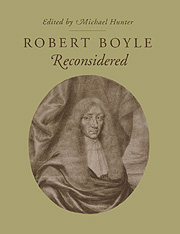Book contents
- Frontmatter
- Contents
- List of contributors
- List of abbreviations
- Preface
- 1 Introduction
- 2 Virtue, providence and political neutralism: Boyle and Interregnum politics
- 3 Science writing and writing science: Boyle and rhetorical theory
- 4 Learning from experience: Boyle's construction of an experimental philosophy
- 5 Carneades and the chemists: a study of The Sceptical Chymist and its impact on seventeenth-century chemistry
- 6 Boyle's alchemical pursuits
- 7 Boyle's debt to corpuscular alchemy
- 8 Boyle and cosmical qualities
- 9 The theological context of Boyle's Things above Reason
- 10 ‘Parcere nominibus’: Boyle, Hooke and the rhetorical interpretation of Descartes
- 11 Teleological reasoning in Boyle's Disquisition about Final Causes
- 12 Locke and Boyle on miracles and God's existence
- Bibliography of writings on Boyle published since 1940
- Index
2 - Virtue, providence and political neutralism: Boyle and Interregnum politics
Published online by Cambridge University Press: 03 December 2009
- Frontmatter
- Contents
- List of contributors
- List of abbreviations
- Preface
- 1 Introduction
- 2 Virtue, providence and political neutralism: Boyle and Interregnum politics
- 3 Science writing and writing science: Boyle and rhetorical theory
- 4 Learning from experience: Boyle's construction of an experimental philosophy
- 5 Carneades and the chemists: a study of The Sceptical Chymist and its impact on seventeenth-century chemistry
- 6 Boyle's alchemical pursuits
- 7 Boyle's debt to corpuscular alchemy
- 8 Boyle and cosmical qualities
- 9 The theological context of Boyle's Things above Reason
- 10 ‘Parcere nominibus’: Boyle, Hooke and the rhetorical interpretation of Descartes
- 11 Teleological reasoning in Boyle's Disquisition about Final Causes
- 12 Locke and Boyle on miracles and God's existence
- Bibliography of writings on Boyle published since 1940
- Index
Summary
Over the last two decades, a developing sociology of science has placed Boyle within the specific contention that the Scientific Revolution rested essentially on political, social and material foundations. A key writer in this emerging orthodoxy was James Jacob, who argued that Boyle's science, politics and religion were direct ideological responses to the wider context of political instability in the Interregnum and Restoration. On this reading, Boyle's material circumstances during the English Civil War and its aftermath produced a social ethic of expediency, which, in turn, was transformed at the Restoration into the ideological advancement of the mechanical philosophy on behalf of the Royal Society and the Anglican Church.
Although this work proved a timely corrective to internalist studies that gave little attention to social context, and thus opened up new fields of enquiry into the social relations of science, Jacob's treatment of both Boyle and the Royal Society was open to the charge of being excessively monocausal. In so far as the Society was supposed to have had a specific corporate ideology contained and expressed in Thomas Sprat's History, Michael Hunter convincingly showed that though the History was certainly commissioned by the Society, it was not very closely supervised because a specific public role for science representing the Society's ethos remained very imprecise beyond a broad Baconianism.
- Type
- Chapter
- Information
- Robert Boyle Reconsidered , pp. 19 - 36Publisher: Cambridge University PressPrint publication year: 1994
- 4
- Cited by



